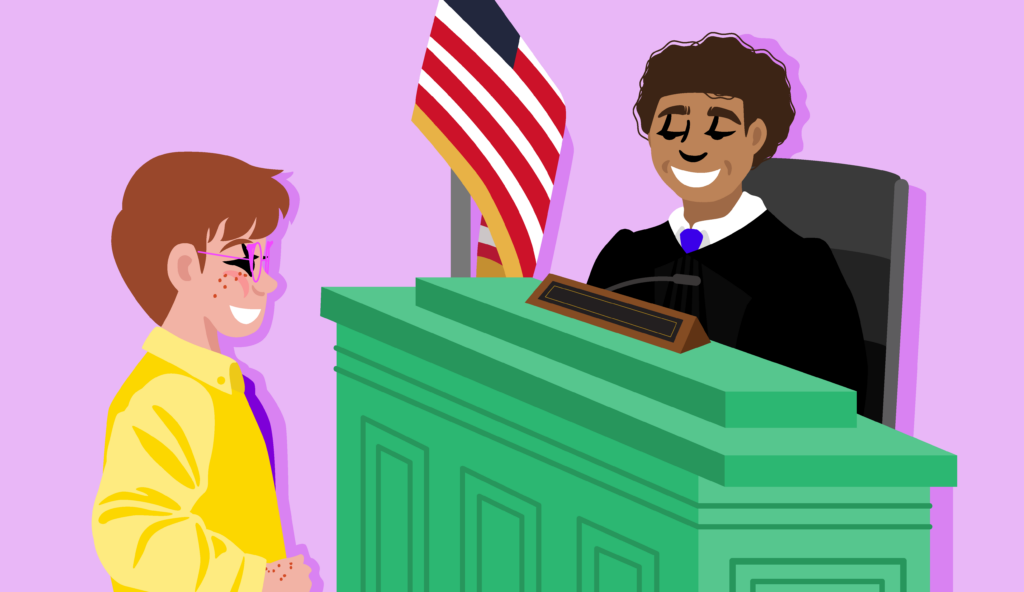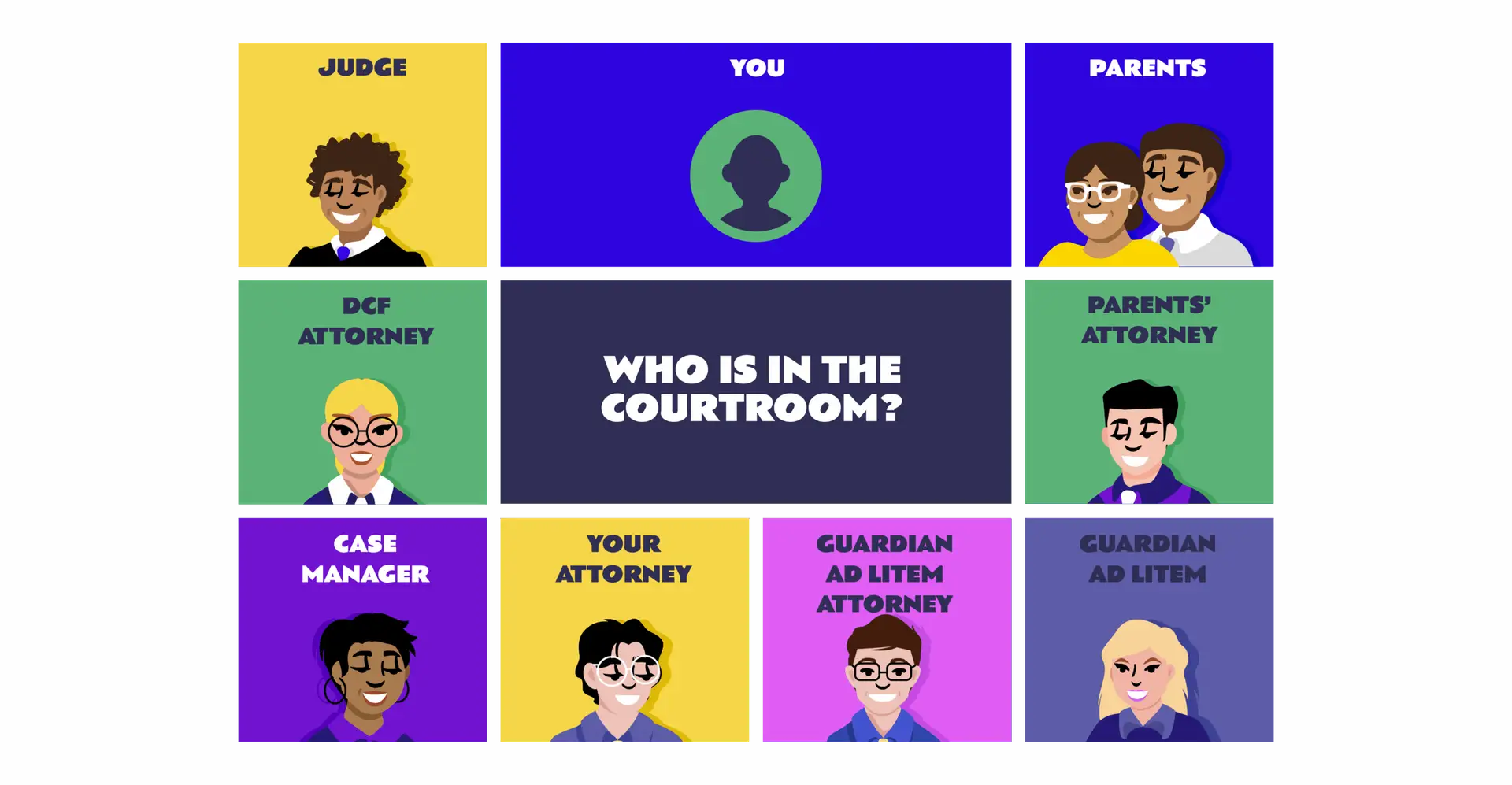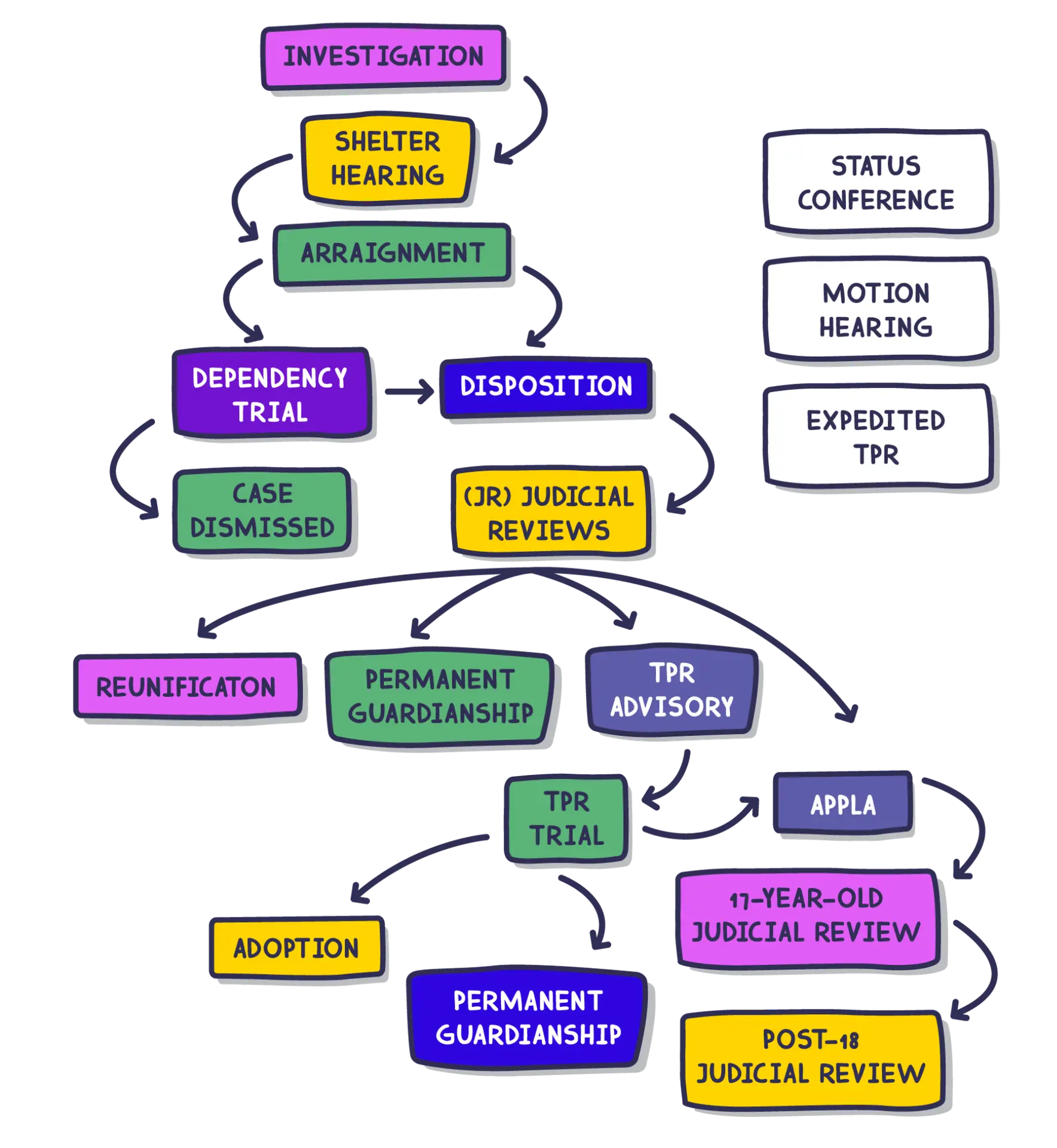All About Court
When you’re in foster care, there will be court hearings where the judge will make decisions about your future. Explore the chart below to learn about the different court hearings and what happens in each of them.

When you go to court, you might be wondering who will be there. The chart below shows you who will be at your hearings.

A case plan goal is made to plan for your future. Sometimes your case can have more than one goal. The case plan goal can be one or more of the following: reunification, adoption, permanent guardianship (PG), and/or another planned permanent living arrangement (APPLA).
 SCRAPPY TIP: If you don’t know the case plan goal, ask your case manager at your next home visit.
SCRAPPY TIP: If you don’t know the case plan goal, ask your case manager at your next home visit.
Click the boxes below to learn more about what happens in each court hearing and select from the drop down menu to see the path to get to each case plan goal.
INVESTIGATION
If someone reports that they think you are not safe, an investigator will go to the home to check on you. They will talk to the parents or adults who care for you, they will also talk to you, and they will talk to the people who know the family which could be relatives, neighbors, teachers, doctors, and more. If the investigator believes the parents or caregivers need help but you are not in danger, they may offer the parents resources or services like parenting classes, mental health treatment, and more, and will come back to check on the family to see how things are going. If the investigator feels you are in danger, they will remove you from your home right away and place you with a family friend, relative, or in foster care. If you are removed from your home, a court hearing will happen within 24 hours where a judge will decide if they agree with the investigator that you are in danger and cannot go home. This is called a shelter hearing.
SHELTER HEARING
At this hearing a judge will decide if it is safe for you to return home after reading all of the facts from the investigation. The parents will also have a chance to tell their side. Kids are not always brought to the shelter hearings, but as a party to the case you have a right to attend and should tell an adult if you want to go to court. If the judge decides it is safe for you to go home, the case is closed and you will go home. If the judge decides it is not safe for you to ho home, they will order that you cannot go home right now. Also during this hearing, the court and family will be told where you are placed, where you will attend school, how often and where you will visit with parents and siblings. The parents, and you if you are at court, can also tell the court about any other family or friends you want to live with that you did not already tell investigators about. The investigator will then go out to the home to see if it is safe for you to live there.
ARRAIGNMENT
At or before this hearing DCF will give the parents a packet of papers that explains the reasons they do not believe it is safe for you to go home to your parents right now. This packet of papers is called a Dependency Petition. The reason for this hearing is to make sure (1) the parents get this packet of papers, and (2) for the court to find out if the parents will agree to do services to help them work on the reasons you were removed from your home. Some examples of services they could be asked to do are therapy, anger management, drug testing, parenting classes. If the parents do not agree to do services, they can ask for a trial for you to come home without them needing to do services. They would need to have witnesses and evidence to show why it is safe for you to go home, and the judge will be the person who decides what will happen.
If the parent agrees to a case plan, you are then adjudicated dependent –this means the judge will continue to make decisions about you and where you will live and DCF must continue to help get you services and all the things you need.
DEPENDENCY TRIAL
If the parent does not agree with the reason why you were removed from the home, the court will have a trial. During the trial, the parent(s) will have an attorney to represent their position. DCF will have to prove to the judge that it is unsafe for you to go home. DCF and the parents can have witnesses (people they know) talk to the judge and they can both give the judge evidence to help their side. After all of the witnesses speak and all of the evidence is given to the judge, the judge makes a decision on whether it is safe for you to go home. If the judge believes it is not safe, you will stay in your current placement. If the judge believes it is safe for the you to go home, then you will go home right away.
After trial, if the judge decides it is NOT safe for you to go home, then you are adjudicated dependent –this means the judge is able to continue to make decisions about you and where you will live and DCF must continue to help get the you services and all the things you need.
DISPOSITION
After the parents either agree to do services or the court rules they need to do services after a trial, the judge will order the parents to do services and tasks to help them make sure you will be safe before you go home. These services and tasks are called a case plan. When the parents are given this case plan the court will also give a date the case plan needs to completed by.
JUDICIAL REVIEW
The Court will have a hearing every six months to see how the parents are doing with their case plan tasks and how you are doing in your placement. **A child is a party to the case and has a right to attend hearings if they wish to. You should tell an adult if they want to go to court.**
REUNIFICATION
If the parent(s) do all of the case plan tasks and the judge agrees you can safely go back home, the judge will reunify you with your parents and you will go home. The judge will set one more hearing after 6 months to make sure everything is going well for the family. The case can close after you have been home for 6 months. There may be more hearings during this 6 month period to check in to see how you and your family is doing.
PERMANENT GUARDIANSHIP
If the parent does not do all of their case plan tasks and cannot be reunified, you may be able to live with a permanent guardian. The permanent guardian is an adult that is either a family member, a friend, or some other responsible adult that is willing to be a placement for you at least until you turn 18. You can tell the judge or your case manager, guardian ad litem, or attorney whether you want to live with the permanent guardian. You can usually still visit with the parent if you go to live with a permanent guardian, but sometimes the judge may say the visits must be supervised or that the guardian can decide when and how the visits will happen.
TPR ADVISORY
In some cases, DCF believes the reason you were removed cannot be fixed and they do not think it is ever safe for you to go back home. In these cases, DCF will give the parents a packet of papers called a Termination of Parental Rights Petition. DCF will ask for a trial to terminate your parents’ rights. This means DCF is asking for your parents to not legally be your parents anymore, and you could then be adopted by another adult or adults who can take care of you. It is possible for the parent to agree to the termination of their rights and go to court and surrender their rights voluntarily. If they do, then there would be no trial.
TERMINATION OF PARENTAL RIGHTS TRIAL
DCF will file a petition for termination of parental rights if (1) the parent does not finish their case plan tasks so there is no way to know if you will be safe to go home or (2) finishes their case plan tasks but does not appear to have made any changes in the behavior that caused you to be unsafe. Termination of parental rights means you will no longer live with the parent(s) and the parent(s) cannot make decisions for you. The judge will set a trial and hear evidence from all sides before making a decision. You can also ask to speak to the judge if you would like the court to know what you want.
ADOPTION
After the parents’ rights are terminated, you can be adopted. You can be adopted by a family member, foster parent, family friend, or a person or family member you do not know but would be able to get to know before moving in. DCF will look at the person’s home, job, background checks, and history before they let that person or family adopt a child. You must be with an adoptive family for at least 3 months before being adopted. If you are over the age of 12 you have the right to say if you agree or do not agree to be adopted. The court will ask for your consent (or agreement) your own adoption. Even if you are under the age of 12, you can always request to come to a court hearing and tell the judge what you want. Once you are adopted, you no longer come to court and the case is closed.
**If a teen does not want to be adopted, does not want to live with a permanent guardian until 18, and cannot be reunified with their parent(s), they can decide to stay in foster care or their group home until they turn eighteen (18).** This case plan goal is called APPLA
ANOTHER PLANNED PERMANENT LIVING ARRANGEMENT (APPLA)
If you are 16 or 17 and do not want to be adopted or live in permanent guardianship, the case plan goal will change to APPLA. This means you will stay in a foster care placement until you turn 18 and the court focuses on helping you get ready to be an adult.
17-YEAR-OLD JUDICIAL REVIEW
This is like a regular judicial review, but the court asks questions just about you. The judge will ask DCF if they gave you a Florida ID or a driver’s license, birth certificate, health insurance card, a bank account, and a social security card. The judge can also issue an order removing the “disability of nonage” which means you will be able to do things like open a bank account before turning 18. Make sure to ask for a copy of this order so you can open a bank account on your own. The judge will also ask you what you want to do after turning 18 and if you plan to enter EFC or PESS (link) The judge will also ask where you want to live when you turn 18. The judge will set two more 17-year-old judicial reviews – 17 ½ and 17 ¾. You will be able to attend these hearings and can talk to the judge about any issues.
POST 18 JUDICIAL REVIEWS
If you are over 18 but enrolled in extended foster care or the court has extended your case for another reason, the court will have a hearing every six months to see how you are doing. The court will check to see if you are in an activity you need to be in to stay in EFC (school, work, or have a disability that makes you unable to go to school or work). You can also bring up any issues or needs you have at these hearings. Remember to ask your case manager if you need help getting to the hearings.
Other hearings (not in flow chart but as an aside)
EXPEDITED TERMINATION OF PARENTAL RIGHTS TRIAL
DCF will file an expedited petition for termination of parental rights if DCF believes what caused you to be removed was so unsafe that even giving your parents a case plan will not make it safe enough for you to go home. Termination of parental rights means you will no longer live with your parent(s) and your parent(s) cannot make decisions for you. The Judge will set a trial and hear evidence from all sides before making a decision. If both of your parents’ rights are terminated, DCF will usually then look for adoptive parents for you.
STATUS CONFERENCE
At any time after the Disposition, the Judge can set a status conference to talk about any emergencies or other issues you or your parents may be having. A status conference can happen in between Judicial Review hearings if a judge wants an update on something before the Judicial Review. An example could be to have an update on medical treatment you may need. A child is a party to the case and has a right to attend hearings if they wish to. You should tell an adult if you want to go to court.
MOTION HEARINGS
At any time during the case, an attorney can file a motion and set a hearing with the court. The motion could be for something like moving your placement from foster care to a relative, a motion to reunify you with your parents, and more.
FosterPower provides information on the benefits, protections, and legal rights of children in Florida’s foster care system and does not include opinions. FosterPower is a non-partisan and independent project that is not affiliated with a government agency or organization. FosterPower is updated frequently, but you should always verify the law independently to ensure it is current.
Legal Disclaimer
FosterPower provides information on the benefits, protections, and legal rights of children in Florida’s foster care system and does not include opinions. FosterPower is a non-partisan and independent project that is not affiliated with a government agency or organization. FosterPower is updated frequently, but you should always verify the law independently to ensure it is current.
The content in this app is legal information and not legal advice. If you need legal advice on your specific situation then you should contact a lawyer.
Legal Disclaimer FosterPower provides information on the benefits, protections, and legal rights of children in Florida’s foster care system and does not include opinions. FosterPower is a non-partisan and independent project that is not affiliated with a government agency or organization. FosterPower is updated frequently, but you should always verify the law independently to ensure it is current.
The content in this app is legal information and not legal advice. If you need legal advice on your specific situation then you should contact a lawyer.

